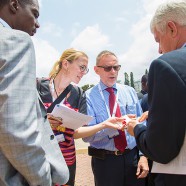PanAfGeo first training on Artisanal and Small-Scale Mining
PanAfGeo Work Package 3 is delivering a training to African governments on managing artisanal and small-scale mining.
PanAfGeo plays an important role in increasing the geological knowledge of African countries and is focused on helping governments improve estimates of their national mineral reserves in order to have a clearer view of potential revenues and increase bargaining power with mining firms. It is a collaboration between IGF (Intergovernmental Forum on Mining, Minerals, Metals and Sustainable Development), the EuroGeoSurveys (EGS) and its counterpart in Africa, the Organisation of African Geological Surveys (OAGS).
The European Commission has also provided financial support for PanAfGeo’s WP3 program, which aims to deliver seven regional training sessions in 2017-2019.
The first training session takes currently place in Accra, Ghana September until the 21st, 2017. More than 40 representatives from Ghana and 11 representatives from the geological surveys in neighbouring countries will be attending the training. The first training session takes currently place in Accra, Ghana until the 21st 2017 of September.
The main aim of the workshop is to train staff from the Ghana Geological Survey Authority (GGSA), regulatory agencies and the universities involved in the ASM sector to strengthen their capacity to assist ASM operators in Ghana while providing regional perspectives. Particular emphasis will be on how the knowledge and skills resources of the GGSA can be mobilized more actively in the service of ASM operators so as to ensure more profitable, efficient, environmentally friendly, safe and sustainable mining operations in Ghana.
ASM operations employ more than 1 million people in Ghana and provide a livelihood to approximately 4-6 million. It is estimated that legal ASM accounts for more than one third of gold exports from Ghana while the share provided by illegal ASM is unknown.
Thus, while legal ASM contributes significantly to Ghana’s GDP, illegal mining is a sustained and increasing cause of concern. In fact, what is referred to as “Galamsey,” is threatening to pollute and spoil vital water bodies and farmlands, thus putting the country’s economy and citizens’ livelihood and health at risk. Civil society organisations and top authorities in Ghana, including President Nana Akufo-Addo, have joined forces to fight “Galamsey.”
Yet, even legal miners rarely undertake sufficient pre-operation geological investigation and miners tend to shy away from authorities and governmental scrutiny, knowing they will be called out as “scape goats” or face repercussions in the event of unwanted mining footprints. Being a non regulatory body, the GGSA could come to play a crucial role in helping legal ASM operators mine more efficiently and knowledgeably by way of knowledge transfer and on-site guidance. Because the mandate of GGSA is mainly geo-scientific research/advisory, GGSA staff stand a better chance of “nudging: miners to optimize their operations in accordance with state-of-the-art methods, thus helping to bring the mining sector onto a less damaging track.
The training seeks to lend geo-scientific support to and empower GGSA staff to become such crucial partners in improving mining operations in Ghana and to provide know-how to mining operators across Africa.
It was organized jointly with Ghana Geological Survey Authority (GGSA) with participants from national geological surveys in Sierra Leone, Gambia, Liberia, and Nigeria. The WP3 training session in Ghana is providing by the Geological Survey of Denmark and Greenland (GEUS) and a number of local co-trainers from GGSA, MC and the universities. For more details, you may view the press release and training program.
Following the training session, a Handbook on ASM in Ghana will be developed by the trainers and co-trainers based upon this handbook outline. The handbook is intended as a reference book for the ASM sector in Ghana produced by national experts in the ASM sector.
A soft copy of the handbook, the video of the presentations and the provided power point presentations will be available on the PanAfGeo website. It is the hope of PanAfGeo that this material will serve as a manual used in additional training sessions in Ghana on issues related to ASM.
Several media are already covering the success of the training, like the Daily’s Graphic and the Ghana News Agency (1) and (2).
The second training session is tentatively scheduled to be in Lusaka, Zambia March 13-16, 2018 and organized jointly with Geological Survey of Zambia and the UNDP ACP program in Zambia. This training session is expected to have regional participation from national geological surveys in Namibia, Zimbabwe, Botswana and South Africa.
For questions regarding WP3 please contact:
WP3 Leader John Tychsen (GEUS): Mail: JT@geus.dk
WP3 Co-leader Daniel Boamah (GGSA): Mail: boamahkwaku@yahoo.com
WP3 Deputy Co-Leader Jules Cesar Yaganza : Mail: legrand_cesar@yahoo.fr


